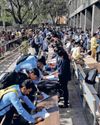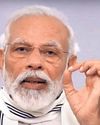
The guidelines issued on March 24 on the measures that the Centre and the State/Union Territory governments should take for containment of COVID-19 do not specifically suspend the functioning of judicial services, including courts. The list of exceptions to suspended services too does not include judicial or legal services. Such omission is valid because the executive cannot circumscribe the functioning of the judiciary in deference to the doctrine of separation of powers and the independence of the judiciary.
But that does not mean that the judiciary, on its own, cannot adapt itself to changing times. From March 25, the Supreme Court and the High Courts decided to hear matters involving “extreme urgency” through video-conferencing and e-filing of petitions and affidavits during the nationwide lockdown, which now stands extended till May 3.
But the limited functioning of the courts has hampered their contribution to mitigating the common man’s suffering. The Supreme Court, for instance, is yet to prioritise hearing of pending cases relating to issues such as the repeal of Jammu and Kashmir’s special status under the Constitution, electoral bonds, women’s right to worship at Sabarimala, and the Citizenship Amendment Act. The hearing of such cases would require the court to adopt technology in a big way in order to comply with the physical distancing norms. Currently, there are two virtual courts, each comprising two or three judges, even though the effective strength of the court is 33. But the court’s response to pleas for intervention by or on behalf of those in distress has not been entirely satisfactory.
Esta historia es de la edición May 08, 2020 de FRONTLINE.
Comience su prueba gratuita de Magzter GOLD de 7 días para acceder a miles de historias premium seleccionadas y a más de 9,000 revistas y periódicos.
Ya eres suscriptor ? Conectar
Esta historia es de la edición May 08, 2020 de FRONTLINE.
Comience su prueba gratuita de Magzter GOLD de 7 días para acceder a miles de historias premium seleccionadas y a más de 9,000 revistas y periódicos.
Ya eres suscriptor? Conectar

Sarpanchs as game changers
Odisha manages to keep COVID-19 well under control because of the strong participation of panchayati raj institutions and the community at the grass-roots level under the leadership of Chief Minister Naveen Patnaik.

New worries
Kerala’s measured approach to the pandemic and lockdown has yielded results. But it still has to grapple with their huge economic impact on its economy, which it feels the Centre’s special financial relief package does little to alleviate.

Capital's Malthusian moment
In a world that needs substantial reorienting of production and distribution, Indian capital is resorting to a militant form of moribund neoliberalism to overcome its current crisis. In this pursuit of profit, it is ready and willing to throw into mortal peril millions whom it adjudicates as not worth their means—an admixture of social Darwinism born of capital’s avarice and brutalism spawned by Hindutva. .

Waiting for Jabalpur moment
The Supreme Court’s role in ensuring executive accountability during the ongoing lockdown leaves much to be desired. Standing in shining contrast is the record of some High Courts.

An empty package
The Modi regime, which has been unable to control the COVID-19 infection, restore economic activity and provide relief to millions exposed to starvation, trains its sights on Indian democracy, making use of the panic generated by fear and a lockdown that forecloses paths of resistance.

Job Offers Withdrawn, Internships Now Unpaid
Engineering and business school graduates stare at a bleak future as job offers are withdrawn or revised, while delays in joining dates add to the climate of uncertainty.

In search of a road map
It is now increasingly clear that the government did not think through and provide for the consequences of the lockdown.

Clueless captain
As the nation longs for relief from the pandemic and the economic misery caused by an ill-planned lockdown, the government prefers symbolism over substance, exposing its lack of meaningful leadership.

RISING TREND
There are no signs of any let-up in the COVID case numbers well into the third phase of the lockdown even as issues of violation of physical distancing norms, mistreatment of front-line health workers, inadequate public health infrastructure and increasing distress among the poor come to the fore in most States, besides of course the low testing numbers and haphazard screening and isolation of suspect cases.

Dystopian pipe dream
The reluctance of the Narendra Modi regime to extend fiscal support to those in real need of help during a prolonged lockdown suggests that it is promoting further concentration of capital. Dire consequences await the economy and the polity.